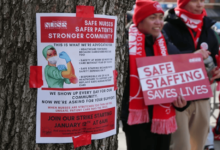RCN to lobby for ‘big commitments’ on pay and staffing

The Royal College of Nursing (RCN) has pledged to use 2024 to fight for new commitments to safe nurse staffing and a “fair pay rise” for nursing.
In a new year’s message, RCN chief executive and general secretary Pat Cullen said the strikes and campaigning of 2023 had won gains but “not the revolution that nursing needs”.
In the year ahead the RCN would be looking to lobby politicians further for a “big commitment to improve staffing levels and patient safety” as well as better pay for nurses, said Ms Cullen.
She noted that 2024 was a general election year and that “every party will be challenged by the RCN to demonstrate clear vision and hard cash for nursing, the NHS and social care”.
Addressing RCN members, Ms Cullen said: “Please continue to share your views with the college and let’s make sure we again push ministers further than they want to go.”
The RCN remains in dispute with the government in England over nurse pay.
It is currently asking its members working for the English NHS about the challenges they are facing and their appetite for further industrial action.
The college said that early signs from the consultation were indicating “continued high levels of discontent over pay and staffing levels”.
In Wales and Scotland, the RCN said it was currently working to hold the governments there to account for implementing previous pledges designed to improve the working lives of nursing staff.
Meanwhile, nursing staff in Northern Ireland are still without a 2023-24 pay deal amid an absence of a fully functioning devolved government.
The college said it was continuing to ask RCN members and the public in the Northern Ireland to write to their MLAs and demand change.
Separately, it is also asking members in England, Wales and Scotland to write to MPs to oppose anti-strike measures being rolled out in health services as part of the Strikes (Minium Service Levels) Act that was made law last year.
The government is seeking to implement regulations, made possible through the Act, that would mean hospital bosses could force a nurse to work instead of strike, or face dismissal.
“Despite promises earlier this year that the new Strikes (Minium Service Levels) Act would not target nursing staff, we’re now faced with proposals for hospital workers that could see them forced to work during strikes or face the sack,” said Ms Cullen.
“What happens when our politicians turn their backs on us? When governments refuse to hear our concerns about patient safety, pay and safe staffing? We’re forced to strike.
“This is why my personal plea to each of you is to write to your MP and urge them to protect your right to strike.”
A government consultation on introducing minimum service levels regulations in hospital services closed on 14 November 2023.
Long-running concerns over staffing means the college, last year, announced plans to campaign for defined nurse-to-patient ratios for every health and care setting across the UK.
According to the RCN, nursing staff are currently routinely caring for 10 to 15 patients at a time, which the college warned was unsafe.
A YouGov poll carried out on behalf of the RCN in December 2023 found 65% of the British public think one nurse should be responsible for a maximum of six patients on non-critical care hospital wards.

Nicola Ranger
Following a recent safe staffing summit, RCN chief nurse Professor Nicola Ranger said: “We can’t sit back and accept the status quo anymore.
“For too long, nurses have been too polite, too accepting.
“We must fight for the future we want to see, and for me that’s safe nurse-to-patient ratios implemented in every care setting, in every part of the UK.”
She said the campaign for nurse-to-patient ratios was still in the planning phase, but that the RCN would soon be asking for evidence from its members to help inform it.







